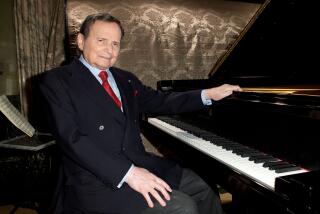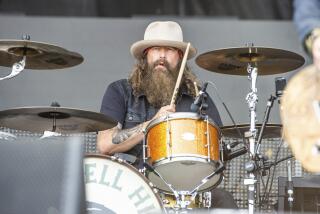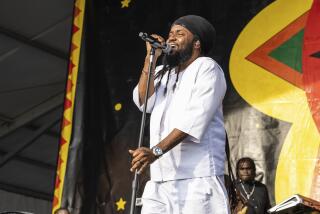Tabu Ley Rochereau dies at 73; musician brought Afro-pop worldwide
Congolese superstar musician and songwriter Tabu Ley Rochereau, whose electrifying performances fused African and Latin rhythms into an irresistible blend, was greatly responsible in the 1970s for bringing Afro-pop to Europe and other parts of the world.
And even when his roller coaster career was hitting one of its low periods — as it was in the mid-1990s when he lived in Anaheim and held court at a local Norm’s restaurant — Rochereau managed to put on a tightly choreographed show complete with band, dancers and masters of ceremonies, all fronted by his honey-toned vocals.
He wrote more than 2,000 songs and his music blend — heavily influenced by Cuban rhumbas — was his own. But Rochereau, who was nicknamed the Elvis Presley of Africa, honed his showmanship from watching U.S. television shows.
“He used to watch any musical show on TV that came from America,” said his long-time musical director, Modero Mekanisi, who now lives in Seattle. “I remember one time he called me from Tokyo and said, “Did you watch ‘Soul Train?’”
Rochereau, 73, died Saturday at Saint-Luc hospital in Brussels, Belgium, his son, Marc Tabu, told the BBC. Rochereau had a stroke in 2008 in the Democratic Republic of the Congo that left him partially paralyzed and ended his performing career.
Amassing a list of survivors would be difficult. Rochereau, famous in his country for his multiple marriages and affairs, had an estimated 68 children, according to the BBC report.
Rochereau was not the first to blend African and Cuban beats, but unlike other Congolese musicians, he actively sought to bring the music to audiences on other continents. In 1970, he played a hugely successful run of 26 performances at the Paris Olympia. “It was the first time that a black star came straight from Africa with a band to play the Olympia,” he said in a 1994 Los Angeles Times interview.
He also played the London Palladium, as well as venues in the Los Angeles area, New York and other U.S. cities. But he declined to shorten songs to an American pop norm, instead performing pieces in the extended Congolese style called soukous, which starts out lilting and then jumps into overdrive with complex rhythms that bring audiences to their feet to dance.
“The drummer beamed a grin at the guitarists, who returned wide smiles that telegraphed the obvious joy their music brings them,” wrote Randy Lewis in a Times review of a 1994 show in Long Beach. “What a welcome contrast to all those rock guitarists whose anguished grimaces make it seem that all they’re getting from their instruments is a couple of thousand volts.”
Pascal Emmanuel Sinamoyi Tabou, as Rochereau’s parents named him, was born in the backwater port town of Banningville in what is now the Democratic Republic of the Congo, according to the biographical notes accompanying his two-volume CD compilation, “The Voice of Lightness.” Although the date of birth varies among sources, Mekanisi said it was Nov. 13, 1940. He was later nicknamed Rochereau after a hero of the Franco-Prussian War.
At 14, Rochereau won a vocal competition to mark the opening of a new stadium in what is now the capital city of Kinshasa. “It was maybe 80,000 people in the stadium; it was live on radio,” Rochereau said. “That same day, I was very known.”
In the 1980s and 1990s, as the dictatorial regime of Joseph Mobutu became more repressive, Rochereau spent increasingly long periods abroad. After Mobutu was forced to flee in 1997, Rochereau returned to serve in various government positions, including cabinet minister. He was in Kinshasa when he suffered the stroke.
Mekanisi hopes to attend the funeral with several musicians who played with Rochereau. “We will play music like the way it was when he was alive,” Mekanisi said.
More to Read
Start your day right
Sign up for Essential California for the L.A. Times biggest news, features and recommendations in your inbox six days a week.
You may occasionally receive promotional content from the Los Angeles Times.







